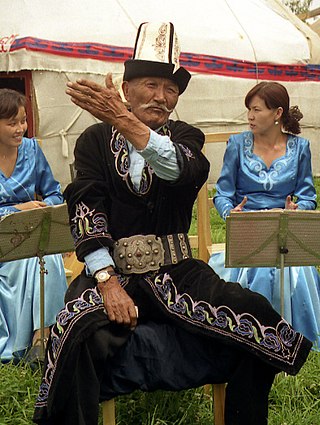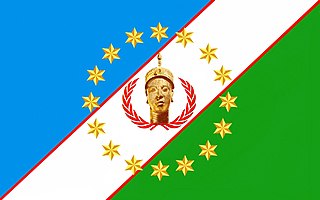Related Research Articles

Akinwande Oluwole Babatunde Soyinka Hon. FRSL, known as Wole Soyinka, is a Nigerian playwright, novelist, poet, and essayist in the English language. He was awarded the 1986 Nobel Prize in Literature, for "in a wide cultural perspective and with poetic overtones fashioning the drama of existence", the first sub-Saharan African to be honoured in that category.

Oral tradition, or oral lore, is a form of human communication wherein knowledge, art, ideas and cultural material is received, preserved, and transmitted orally from one generation to another. The transmission is through speech or song and may include folktales, ballads, chants, prose or poetry. In this way, it is possible for a society to transmit oral history, oral literature, oral law and other knowledge across generations without a writing system, or in parallel to a writing system. Religions such as Buddhism, Hinduism, Catholicism, and Jainism, for example, have used an oral tradition, in parallel to a writing system, to transmit their canonical scriptures, rituals, hymns and mythologies from one generation to the next.

Oduduwa was a Yoruba divine king, legendary founder of the Ife Empire and a creator deity (orisha) in the Yoruba religion. According to tradition, he was the holder of the title of the Olofin of Ile-Ife, the Yoruba holy city. He ruled briefly in Ife, and also served as the progenitor of a number of independent royal dynasties in Yorubaland.

The Igbo people are an ethnic group in Nigeria. They are primarily found in Abia, Anambra, Ebonyi, Enugu, and Imo States. A sizable Igbo population is also found in Delta and Rivers States. Ethnic Igbo populations are found in Cameroon, Gabon, and Equatorial Guinea, as migrants as well as outside Africa. There has been much speculation about the origins of the Igbo people, which are largely unknown. Geographically, the Igbo homeland is divided into two unequal sections by the Niger River—an eastern and a western section. The Igbo people are one of the largest ethnic groups in Africa.

African art describes the modern and historical paintings, sculptures, installations, and other visual culture from native or indigenous Africans and the African continent. The definition may also include the art of the African diasporas, such as: African-American, Caribbean or art in South American societies inspired by African traditions. Despite this diversity, there are unifying artistic themes present when considering the totality of the visual culture from the continent of Africa.

The Gẹlẹdẹ spectacle of the Yoruba is a public display by colorful masks which combines art and ritual dance to amuse, educate and inspire worship. Gelede celebrates “Mothers”, a group that includes female ancestors and deities as well as the elderly women of the community, and the power and spiritual capacity these women have in society. Focusing not only on fertility and motherhood but also on correct social behavior within the Yoruba society.

The culture of Nigeria is shaped by Nigeria's multiple ethnic groups. The country has 527 languages, seven of which are extinct. Nigeria also has over 1150 dialects and ethnic groups. The three largest ethnic groups are the Hausas that are predominantly in the north, the Yorubas who predominate in the southwest, and the Igbos in the southeast. There are many other ethnic groups with sizeable populations across the different parts of the country. The Kanuri people are located in the northeast part of Nigeria, the Tiv people of north central and the Efik-Ibibio are in the south south. The Bini people are most frequent in the region between Yorubaland and Igboland.

The Nupe is an ethnic group native to the North Central of Nigeria. They are the dominant ethnic group in Niger State and a minority in Kwara State. The Nupe are also present in Kogi State and The Federal Capital Territory.

The traditional beliefs and practices of African people are highly diverse, including various ethnic religions. Generally, these traditions are oral rather than scriptural and are passed down from one generation to another through folk tales, songs, and festivals, and include beliefs in spirits and higher and lower gods, sometimes including a supreme being, as well as the veneration of the dead, and use of magic and traditional African medicine. Most religions can be described as animistic with various polytheistic and pantheistic aspects. The role of humanity is generally seen as one of harmonizing nature with the supernatural.

The Hausa are a native ethnic group in West Africa. They speak the Hausa language, which is the second most spoken language after Arabic in the Afro-Asiatic language family. The Hausa are a culturally homogeneous people based primarily in the Sahelian and the sparse savanna areas of southern Niger and northern Nigeria respectively, numbering around 86 million people, with significant populations in Benin, Cameroon, Ivory Coast, Chad, Central African Republic, Togo, Ghana, as well as smaller populations in Sudan, Eritrea, Equatorial Guinea, Gabon, Senegal and the Gambia.

Babatunde Raji FasholaSAN ; born 28 June 1963) is a Nigerian lawyer and politician who served as the federal minister of Works and Housing of Nigeria from 2019 to 2023. He previously served as the minister of Power, Works and Housing from 2015 to 2019. He also served two terms as governor of Lagos State from 29 May 2007 to 29 May 2015.

The Yoruba of West Africa are responsible for a distinct artistic tradition in Africa, a tradition that remains vital and influential today.
Babatunde is a male given name. In the Yoruba language, it means 'father returns', or ' a father has returned'. This generally refers to a male ancestor such as a deceased father, grandfather, or great-grandfather.
Ìyá Nlá is the primordial spirit of all creation in Yoruba cosmology. She is believed to be the source of all existence. Iya Nla literally means “Great Mother” in the Yoruba language. In The Gẹ̀lẹ̀dẹ́ Spectacle: Art, Gender, and Social Harmony in an African Culture, art historian Babatunde Lawal reveals that Ìyá Nlá in Yoruba cosmology is the orisha who is the “Mother of All Things, including the deities.” Lawal also asserts that the female principle in nature has been personified as Ìyá Nlá, whereby human beings can relate to one another as children of the same mother.” Teresa N. Washington’s Our Mothers, Our Powers, Our Texts: Manifestations of Àjẹ́ in Africana Literature, states that Ìyá Nlá — the Mother of All, who is also known as Yewájọbí, Odù, Odùduwà, and Àjẹ́ — is not merely an orisha; Ìyá Nlá is the primordial force of all creation.

The Yoruba people are a West African ethnic group who mainly inhabit parts of Nigeria, Benin, and Togo. The areas of these countries primarily inhabited by the Yoruba are often collectively referred to as Yorubaland. The Yoruba constitute more than 48 million people in Africa, are over a million outside the continent, and bear further representation among members of the African diaspora. The vast majority of the Yoruba population is today within the country of Nigeria, where they make up 15.5% of the country's population according to CIA estimations, making them one of the largest ethnic groups in Africa. Most Yoruba people speak the Yoruba language, which is the Niger-Congo language with the largest number of native or L1 speakers.

Bruce Obomeyoma Onobrakpeya is a Nigerian printmaker, painter and sculptor. He has exhibited at the Tate Modern in London, the National Museum of African Art of the Smithsonian Institution in Washington, D.C., and the Malmö Konsthall in Malmö, Sweden. The National Gallery of Modern Art, Lagos has an exhibit of colourful abstract canvases by Onobrakpeya and his works can be found at the Virtual Museum of Modern Nigerian Art, although no exhibitions were showing as of October 2017.
Nyabinghi, also Nyahbinghi, Niyabinghi, Niyahbinghi, is the gathering of Rastafari people to celebrate and commemorate key dates significant to Rastafari throughout the year. It is essentially an opportunity for the Rastafari to congregate and engage in praise and worship. For example, on July 23 of each year, a Nyabinghi is held to celebrate the birth of Emperor Haille Selassie I. During a Nyabinghi celebration men and women have different roles and expectations. Men are expected to remove any hair coverings, whilst women must keep their hair covered. A group of men typically organise themselves in a line or semi-circle and are assigned to beat the drums throughout. The remaining congregation continue to sing well known songs or 'chants', some of which are Hebraic scriptural verses that evidence the divinity of Haile Sellassie. For example, 'I have a little light in I and I'm going to make it shine, Rastafariiii, shine' and 'Holy Mount Zion is a holy place and no sinners can enter there, so let the words of my mouth and the mediation of my heart, be acceptable in thy sight, of Rastafari'. Nyabinghi is a Rastafari tradition that promotes Rastafari unity, strengthens the Rastafari spirit with fellowship and raises the consciousness and presence of Rastafafari in the heart of those in attendance. At some points passages of the bible are read. Rastafari recognise the significance of Jesus Christ, due to Haile Sellassie I fulfilling the teachings and prophecy of scripture.

Iyami Aje is a Yoruba term of respect and endearment used to describe a woman of African ancestry who is considered to be an Aje, a woman who wields myriad arcane creative biological, spiritual, and cosmic powers.

Peju Layiwola is an art Historian and visual artist from Nigeria who works in a variety of media and genre. She is listed as a "21st Century Avant-Garde" in the book Art Cities of the Future published by Phaidon Press She is currently a Professor of Art and Art history at the University of Lagos and has been described as a "multitalented artist." Her works can be found in the collection of Microsoft Lagos, Yemisi Shyllon Museum, Pan Atlantic, Lagos and homes of private collectors such as JP and Ebun Clark and the Obi of Onitsha.
References
- 1 2 "Babatunde Lawal". The Department of Art History, Factulty: Bio. Virginia Commonwealth University. Archived from the original on 23 May 2014. Retrieved 3 May 2013.
- 1 2 Lawal, Babatunde (1996). The Gèlèdé spectacle : art, gender, and social harmony in an African culture . Seattle: University of Washington press. ISBN 978-0-295-97599-3.
- ↑ "Babatunde Lawal". VCUarts. 2020-02-10. Retrieved 2022-06-09.